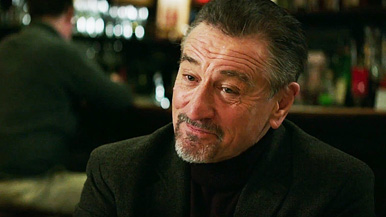Movie Review: The Comedian
By Matthew Huntley
February 15, 2017
Scrolling down the repertoire of director Taylor Hackford, one finds there are more hits than misses, and a running quality throughout Hackford's films (especially his hits) is the characters never seem too far removed from reality. They talk and behave the way real people might in their given situations. This allows the corresponding story to sidestep contrivances and progress not according to what we expect from a Hollywood formula but to how things might actually take shape. Deep down, Hackford knows viewers respond more to truth than artifice.
Perhaps this seems like a rather heavy introduction to a review of The Comedian, but it underlines Hackford's gift for earnest storytelling. His title character is a has-been comic and TV actor struggling to keep his dignity in an industry that rarely rewards age, risk or variety. Jackie Burke (Robert De Niro) is a septuagenarian who, despite his claim to fame as a TV dad on a cheesy but likable 1970s-era sitcom called “Eddie's Home,” still needs to make ends meet. But Jackie has fallen so far below the respectability and public radar, his agent, Miller (Edie Falco), is only able to book him small-time gigs in places like Hicksville, a hamlet on Long Island. Miller tells him his commission in a rundown club is “Eleven dollars and a burger.”
One night Jackie performs among other TV personalities (Jimmie Walker from “Good Times,” Brett Butler from “Grace Under Fire”) and attempts to try out new material but gets backlash from a fan who only wants him to “do Eddie.” As it turns out, the raucous fan and his wife are taping Jackie's performance for their own personal webisode and this instigates a violent confrontation that eventually leads to Jackie's arrest, a 30-day prison sentence and 100 hours of community service.
All this sets in motion, you might say, the next chapter of Jackie's life and reaffirms the notion we're never too old to change and adapt, and that one's success and sense of worth, especially in show business, comes in strides and the only certainty is there are no certainties. Jackie probably never banked on having to borrow money from his younger brother Jimmy (Danny DeVito) and his disapproving sister-in-law (Patti LuPone) to stay afloat, but life can be funny that way.
It can also be funny in the way we encounter other people. While working at a homeless shelter, Jackie meets Harmony Schiltz (Leslie Mann), who must also be of service to the community after she was arrested during a relationship dispute. Harmony is about 30 years younger than Jackie, but their miseries and dysfunctional families allow them to bond, first platonically and then somewhat romantically. Their relationship develops after they strike a deal: she'll accompany him to his lesbian niece's wedding and he'll accompany her to her overbearing father's (Harvey Keitel) birthday dinner, which is just one of many scenes that feels setup to play out a certain way but in fact rolls out differently. For instance, because it's De Niro and Keitel, who are close friends in real life, the conflict between Jackie and Harmony's father could have been a cheap, self-aware-type moment, but the scene (and those thereafter) stays true to the characters in this particular story and not to our knowledge of the actors' other movies.
The Comedian also possesses an insight into a world with which most of us are probably unfamiliar and impresses upon us that it actually knows what it's talking about. I was surprised by how genuine Jackie's trials and tribulations in the field of standup comedy came across, as when Miller gives him a list of options for his next job and tells him how little each of them pays. I guess I shouldn't be surprised by the film's savviness for the entertainment industry, though, since the four-writer screenplay includes Art Linson, who wrote a book called What Just Happened? Bitter Tales from the Hollywood Front Line. Linson has clearly drawn upon his own observations and experiences to contextualize this story.
In addition to its knowledge, The Comedian also lures us in through its drama by having the characters take part in sobering experiences and allowing them to speak dialogue that sounds authentic. This was all the more surprising, I suppose, given the movie's setup, which takes a foul-mouthed, raunchy comic and pairs him with a younger, attractive woman with a domineering father. You'd expect such a scenario to yield something along the lines of, say, Meet the Parents, Analyze This, or Bad Santa, which aren't bad movies, but they've been done. In fact, several scenes in The Comedian feel like they're on the cusp of predictability and/or low wit, but the screenplay turns them around. One of these involves Jackie honoring a legendary comedienne (Cloris Leachman) at an upscale New York club and another in which he extemporaneously performs at a retirement home in Florida. What happens during each of these may be farfetched on paper, but Hackford and his team make them credible.
The Comedian catches us off guard because it goes beyond mere bawdiness and actually takes itself seriously, not only as as a comedy but also as a drama and as a comment on how technology and politics shape entertainment. Because it doesn't simply write itself off as mindless fodder, we don't either, and we find ourselves getting drawn in to this latest chapter of Jackie's life. Instead of seeing him as just a smutty comedian, we see him as a human being who just happens to be a comedian. Nobody, in any profession, wants to be “typecast,” or be thought of as one-dimensional and limited. “The Comedian” tells the story about one man's attempt to resist this seemingly inevitable course. It's not only funny and dramatic, but also somewhat inspiring. This isn't something I expected from the film going in, but movies can be funny that way.
|
|
|
|




